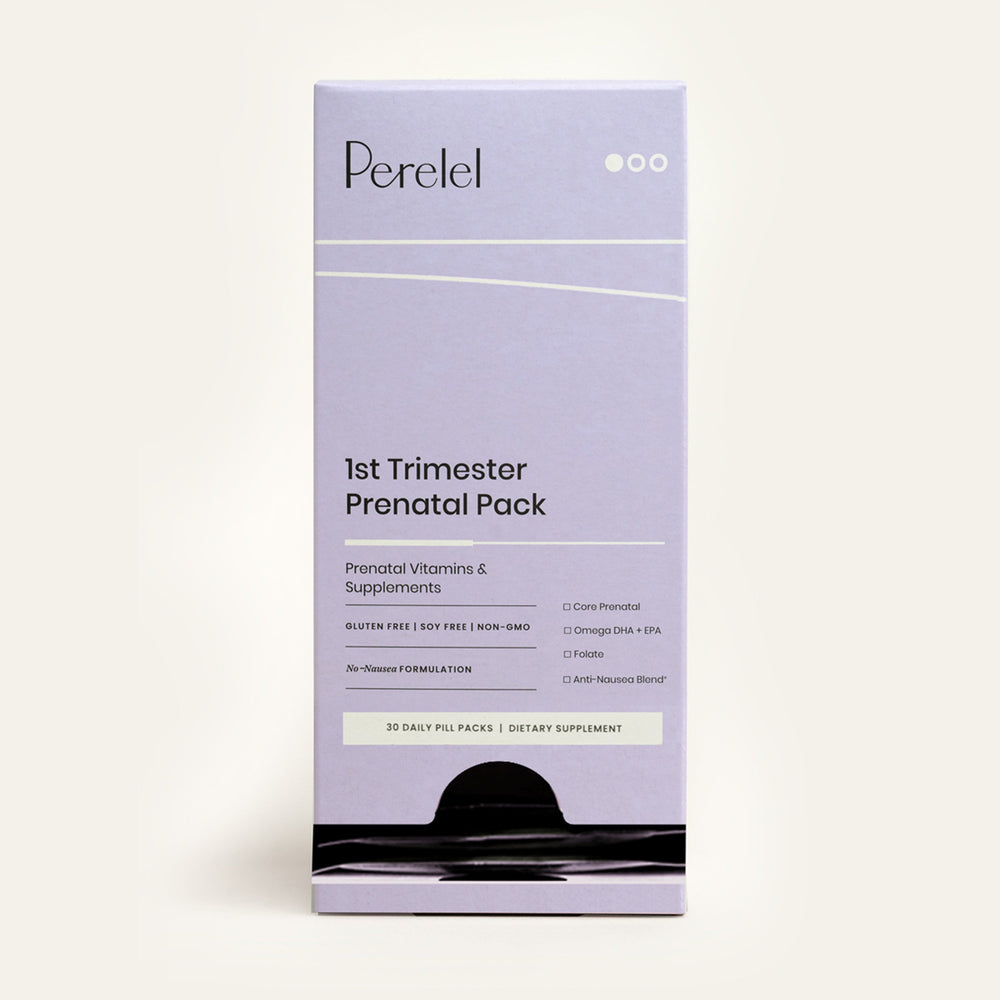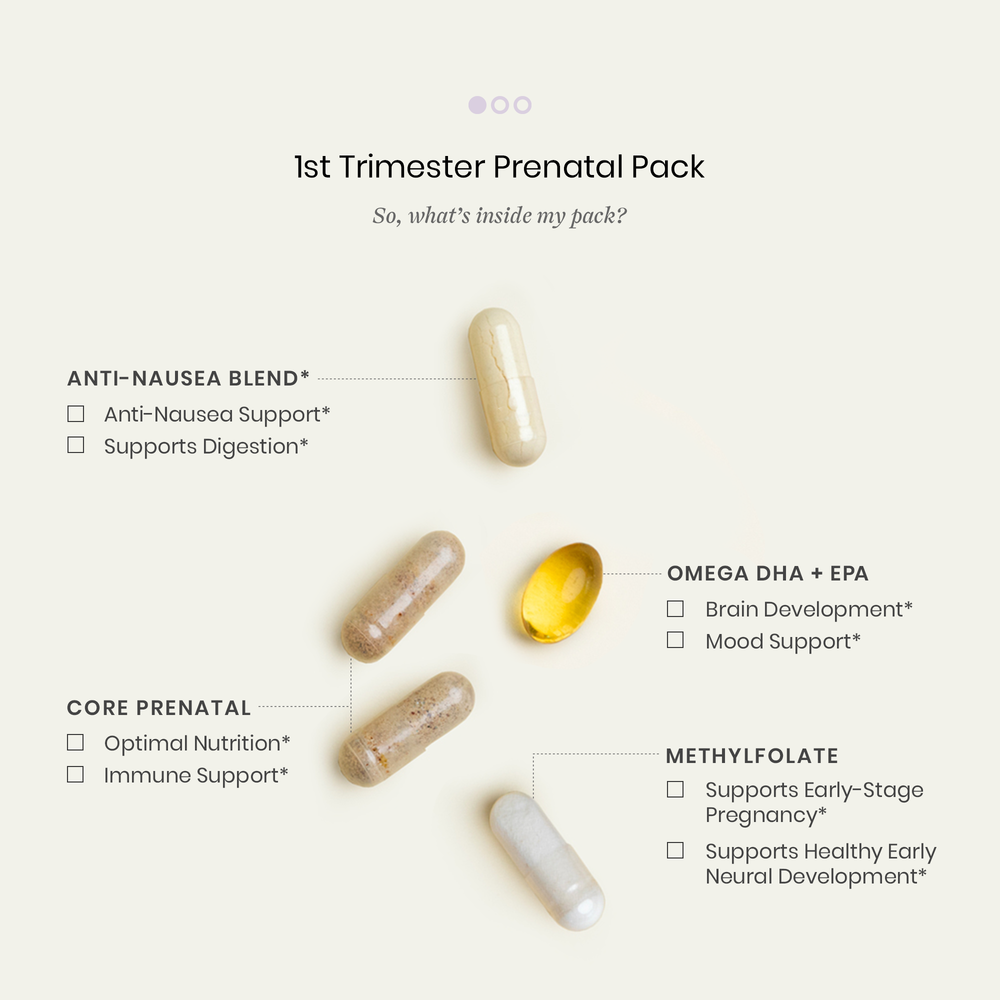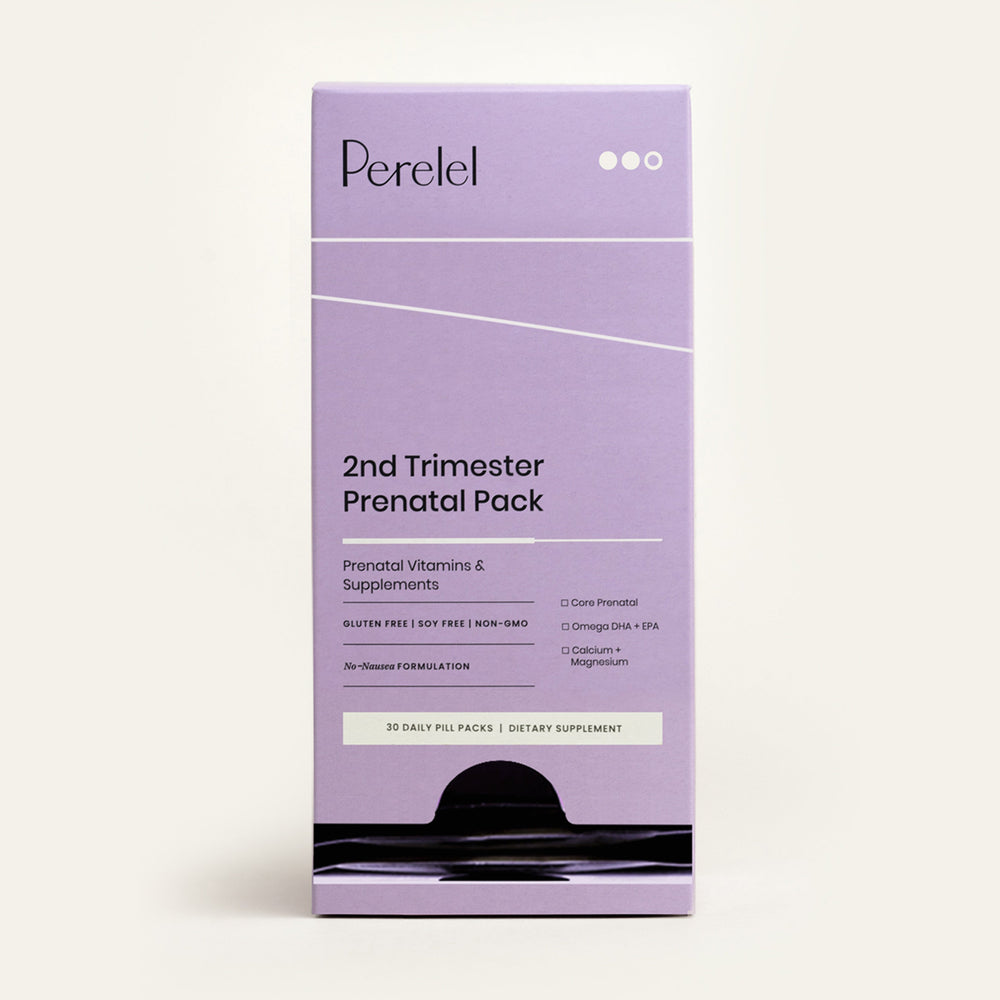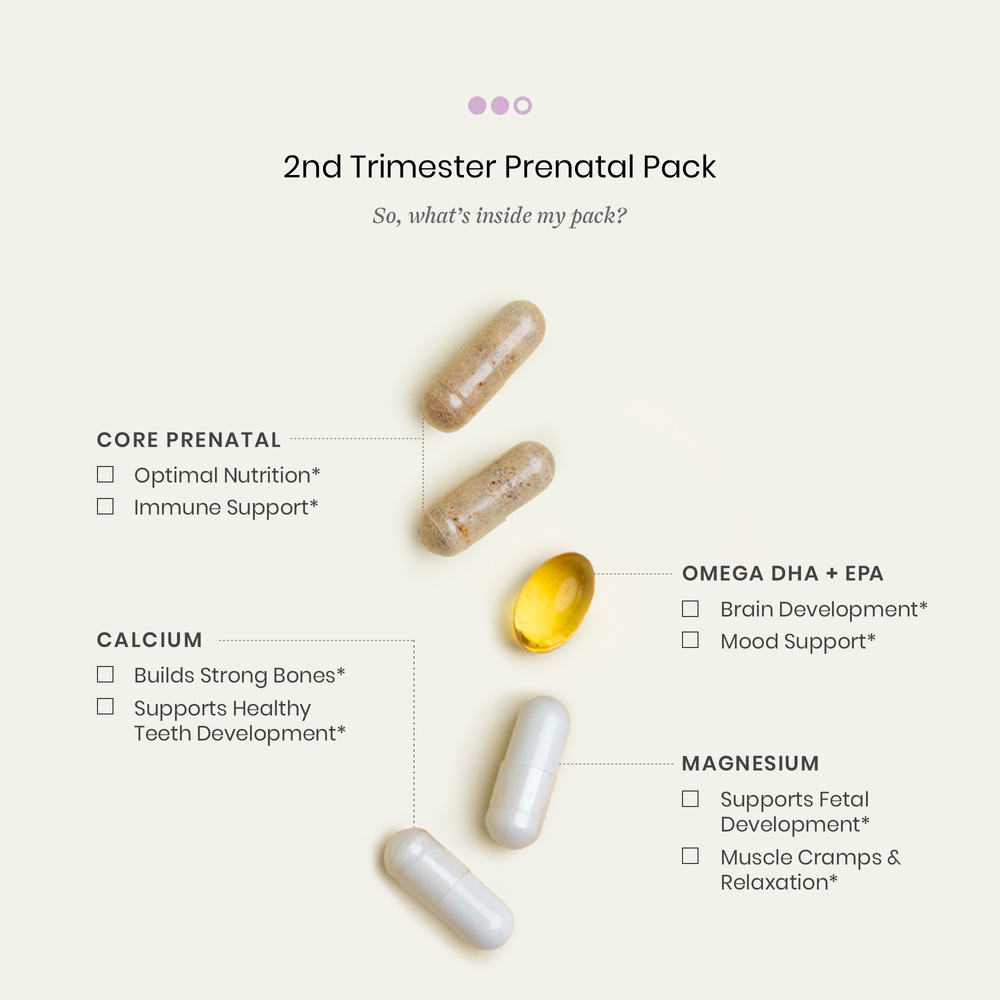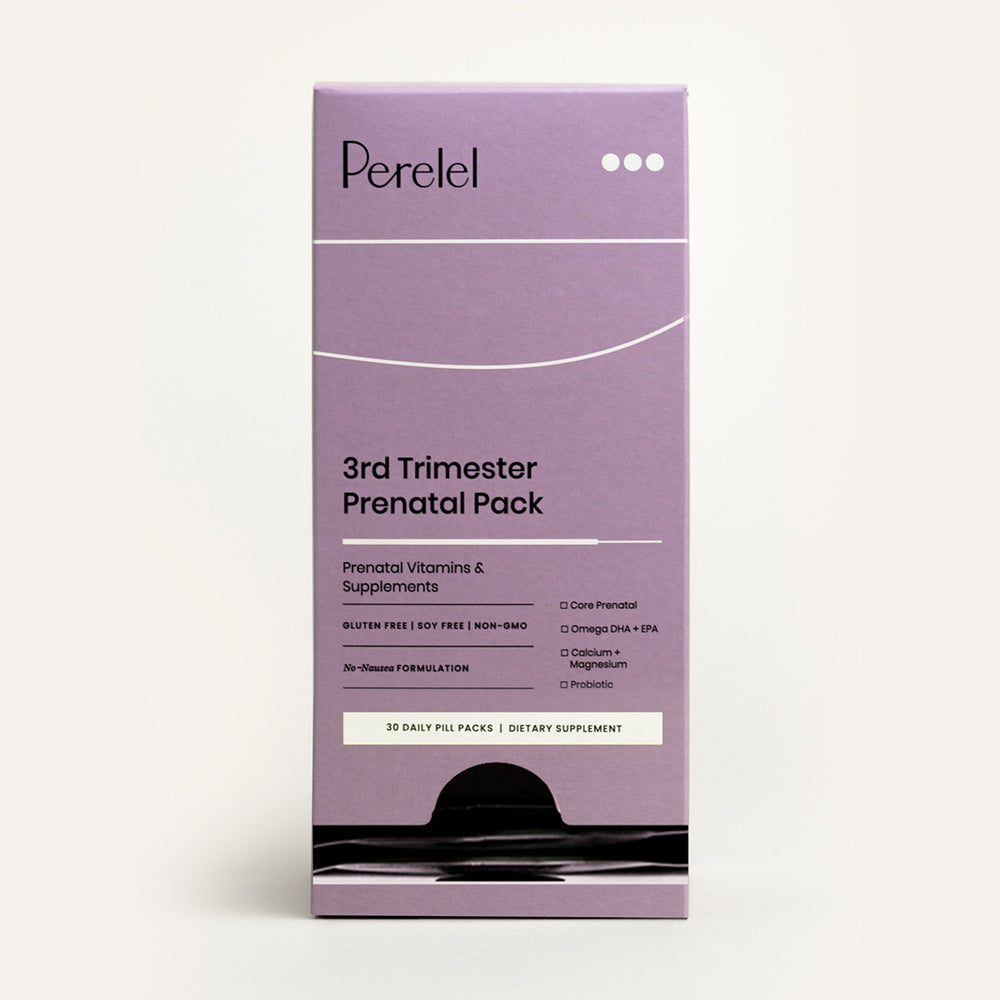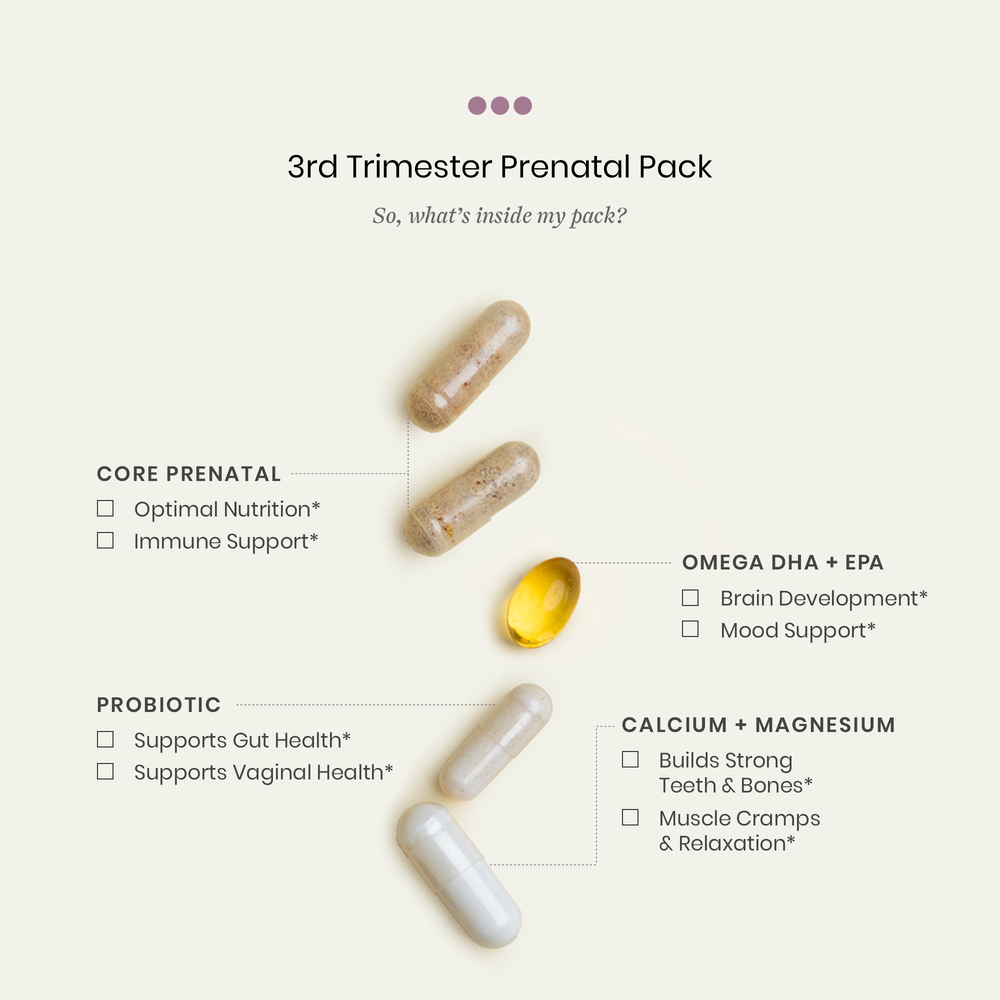No matter where you are on your pregnancy journey, the road to a 360 non-toxic pregnancy may feel like an uphill battle. You want to add supplements to your diet, eat nutritiously, do a clean beauty overhaul, and all the while keep your stress at a minimum. It may feel as though there aren’t enough hours in the day to comb through the ingredient lists and medical journals alone. But identifying habits that are not working for you and swapping them out with healthy practices may play an important role in conceiving and carrying a healthy pregnancy. So to help take on the legwork of your prenatal probe, we decided to do the sleuthing for you by curating our best non-toxic pregnancy tips. The Expecting Mother’s Detox Guide demystifies those ingredient lists, curates expert-backed recommendations, and delivers no-nonsense information so you can focus on what really matters.

Yes & No Prenatal Ingredient Lists
Taking your supplements should be a daily ritual. But sourcing quality ingredients and making sure you’re getting a multitude of nutrients can be a full-time job and makes the hunt feel overwhelming. Tired yet? Us too. Which is why we compiled a research-backed list of Yes & No ingredients to look for when you’re shopping for a prenatal vitamin. Keep this checklist handy to ensure you’re adding in quality, beneficial supplements and taking out all of the unnecessary or even harmful additives.
Yes
- Vitamin A
- Vitamin C
- Vitamin D
- Vitamin E
- Vitamin K2
- Thiamin
- Riboflavin
- Niacin
- Vitamin B6
- Vitamin B12
Keep your dosage to under 12 mcg. High doses of B12 may cause undesirable side effects such as nausea, dizziness, anxiety and headaches. - Folate
Did You Know: 40 to 60 percent of women have a genetic variant, called a MTHFR mutation, that prevents them from being able to properly convert folic acid into its usable form. Make sure you’re taking a methylated format of folate versus folic acid.
- Pantothenic Acid
- Choline
Even if you’re eating a nutritional diet, supplementing additional choline has shown to improve pregnancy outcomes. In fact, studies show that most pregnant women are not achieving the recommended choline intake of 450 mg per day and would benefit from increased choline intake. - Iron
When it comes to iron, be sure to check the format and dosage. Certain formats can be incredibly hard to digest and high levels can also cause serious constipation.
- Iodine
- Zinc
- Selenium
- Copper
- Chromium
- Boron
- Magnesium
- Calcium
Did You Know: Calcium is essential for fetal skeletal development, primarily in the third trimester. - Omegas: DHA & EPA
Did You Know: While DHA is widely known to support brain development, EPA plays a crucial role in helping DHA cross the placental barrier. In other words, you want to be taking both.
No
- Stearic Acid
- Preservatives
- Maltodextrin
- Magnesium Stearate or Magnesium Silicate
- Dicalcium Phosphate
- Sweeteners: Sorbitol, Mannitol & Xylitol
- Titanium Dioxide
- Polyethylene Glycol
- Sodium Ferrocyanide
- Sodium Benzoate
- Sodium Ascorbate
- Ascorbyl Palmitate
- Nitrates
- Ammonium Phosphatides
- Hydrogenated Oils
- Artificial Colors & Dyes
Shop the Article:
Nutrition Cheat Sheet
By Stephanie Lauri, RD, CLEC
Proper diet and nutrition play a major role in setting you and your baby up for a healthy pregnancy. And as your body changes at each stage, your diet and nutrient intake should too. Throughout your entire pregnancy skip smoking, alcohol, and limit your caffeine intake to under 200 mg per day, which is equivalent to about one 12-ounce cup of coffee. Also, consult with your doctor about continuing to use any existing prescription pharmaceuticals. Instead, go back to the basics with whole foods that are nutrient-rich. Here’s your grocery shopping list to get you through the next nine months.
Preconception
Add: Folate, Omega-3 Fats, Iron, Antioxidants
Grocery List: dark leafy greens, beans, nuts and seeds, fatty fish like salmon or tuna, DHA-enriched eggs, full-fat dairy, lean meats and poultry, and colorful fruits and vegetables like citrus, berries, peppers, tomatoes, broccoli, beets and squash.
1st Trimester
Add: Iron, Folate, Vitamin B12, Vitamin D, Iodine, Choline
Grocery List: citrus fruits, dairy, eggs, meat and poultry, fatty fish like salmon or light-canned tuna, legumes, dark green veggies, iodized salt, seaweed, shiitake mushrooms, kidney beans, red potatoes, and fortified cereals and grains.
2nd Trimester
Add: Vitamin C, Antioxidants, Fiber, Protein, Calcium
Grocery List: eggs, meat and poultry, dairy, fish, nuts and seeds, legumes, dark leafy greens, and colorful fruits and vegetables like citrus, berries, peppers, tomatoes, broccoli, beets and squash
Tip: Avoid processed foods that are high in sugar and saturated fats now more than ever to prevent gestational diabetes.
3rd Trimester
Add: Calcium, Phosphorus, Magnesium, Vitamin D, Fiber
Grocery List: dark leafy greens, salmon, sardines, mushrooms, dairy (both animal or nut milks), chia seeds, broccoli, eggs, lentils, whole wheat bread, pumpkin seeds or pepitas, cashews, peanuts or peanut butter, almonds or almond butter, sunflower seeds, black beans, avocado, kidney beans, and dark chocolate.
Stay Hydrated: Aim to drink a minimum of 100 ounces of water daily throughout your pregnancy.
Postpartum
Add: Collagen, Iron, Omega-3 Fats
Grocery List: bone broth, slow cooked meats, grass-fed beef, beans, legumes, nuts and seeds, cooked spinach, fatty fish such as salmon, tuna, and halibut, oysters, anchovies, eggs, and a variety of colorful fruits and vegetables.
Breastfeeding? Your diet plays an important role in delivering the proper nutrients to your baby, which includes the B vitamins, vitamin A, vitamin D, vitamin K, choline, DHA and needed minerals like iodine and selenium. Continue to follow your pregnancy diet while breastfeeding to continue supporting baby’s growth and development.
Stephanie Lauri is a dietician specializing in pre and postnatal nutrition and Certified Lactation Educator based in Los Angeles, California.
Non-Toxic Beauty 101
Let’s open up that makeup bag. We know that limiting your environmental toxin exposures can play a major role in helping you conceive and carrying a safe and healthy pregnancy for both you and your baby. And your personal care and beauty products could potentially be a source of toxic chemical exposure, even if the labels say “natural”. Avoid products with triclosan, BHA, fragrance and oxybenzone as ingredients. Here are some of our favorite clean products to swap into your beauty regime instead.
- Sunscreen
- EltaMD SPF 46 UV Clear ($36)
- Mascara
- Saie Mascara 101 ($24)
- Lotion
- Nécessaire The Body Lotion ($25)
- Lip Gloss
- RMS Beauty Lip Shine ($25)
- Foundation
- Ilia Super Serum Skin Tint SPF 40 ($46)
- Concealer
- RMS Beauty “Un” Cover-Up ($36)
- Nail Polish
- Sundays Nailpolish in No. 17 ($18)
- Deodorant
- Kopari Coconut Deodorant ($12)
- Retinol Replacement
- Face Cleanser
- Youth To The People Superfood Cleanser ($36)
- Body Moisturizer
- PURA D’OR Organic Sweet Almond Oil ($15)
- If you want to be sustainable: Kate Mcleod Mama Stone ($45)
- Tip: Use daily to help prevent stretch marks.
- Body Wash
- Herbivore Botanicals Pink Clay Cleansing Bar Soap ($12)
- Face Exfoliator
- Aesop Purifying Facial Exfoliant Paste ($53)
- Nighttime Face Moisturizer
- Serum
- Juice Beauty Stem Cellular Anti-Wrinkle Booster Serum ($80)
- Eye Gel
- Biossance Squalane + Peptide Eye Gel ($54)
Check to see if your products are safe when trying to conceive, pregnant or breastfeeding using our Unclean15 Label Checker, which scans to see if there are potentially harmful or unsafe ingredients in your products.
Feeling stressed?
Calm your sympathetic nervous system (think—stress and anxiety) and activate your parasympathetic nervous system (relaxation and tranquility) with the 2-1 breathing technique. Incorporate into your daily routine or keep in your back pocket for when you feel stress and anxiety start to peak.
Ready to kickstart your non-toxic pregnancy journey? Add a research-backed, OB/GYN-approved prenatal to your daily routine to support you and your growing baby. Read next: how to build your pregnancy skincare routine.
1 Vitamin B-12. Mayoclinic.org.2 MTHFR mutation and 6 natural ways to manage symptoms. Parsleyhealth.com.
3 Korsmo HW, Jiang X, Caudill MA. Choline: Exploring the growing science on its benefits for moms and babies. Nutrients. 2019;11(8):1823.
4 EWG’s 10 tips for a less toxic pregnancy. Ewg.org.
This article is for informational purposes only. It is not, nor is it intended to be, a substitute for professional medical advice, diagnosis, or treatment and we recommend that you always consult with your healthcare provider. To the extent that this article features the advice of physicians or medical practitioners, the views expressed are the views of the cited expert and do not necessarily represent the views of Perelel.


